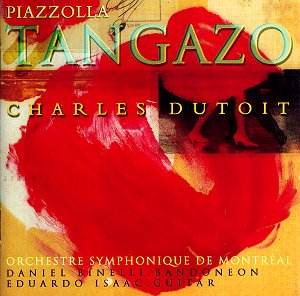Still the Piazzolla bandoneon keeps rolling. After
celebrity excursions from Yo Yo Ma, Barenboim and Kremer, not to mention
innumerable arrangements and reinterpretations, comes this sumptuous
and beautifully recorded programme from Montreal. The notes speak of
tango nuevo as a compound of chromaticism, dissonance and jazz
elements though you will be hard pressed to extrapolate much jazz from
the fabric of the scores – unless you count some innocuous sounding
runs from solo instruments. In fact chromaticism and dissonance are
not the first things to spring to mind either; I would cite a filmic
imagination, textured sonorities, a quixotic structural sense, an occasionally
inspired lyrical gift and some rather stale romantic rhetoric.
That said the music begins unforgettably with Piazzolla’s
most widely known and triumphant piece, Adios Nonino, a tribute
to his father. The 1981 orchestration opens with some all-purpose abrasion,
percussive clatter, staccato piano (much employed in the orchestral
texture here and elsewhere) before opening out into a tune of decisive
beauty and tranquillity. Milonga del angel is evocative but essentially
filmic. The move from a winsome introduction to a more harmonically
animated and austere middle section is certainly welcome but the Francophile
leanings of the composer are always present (the fact that he studied,
briefly I believe, with Boulanger is probably irrelevant here) inasmuch
as the lyric impulse is towards the status of a glorified chanson.
The three movement Double Concerto was premiered by the composer
himself in 1985. The fusion of bandoneon – the mid nineteenth century
German square button accordion – and guitar is effective; the first
movement is withdrawn, the second rather frisky and the finale has a
nice passage for solo violin with momentum increasing to the conclusion
but the thematic material itself is threadbare and the whole piece lacks
any kind of direction or distinction. Oblivion derives from a
film score and features a winding oboe figure and bandoneon quasi-extemporisation
– attractive in its way but slight. The Tres movimientos tanguisticos
portenos are of a more rewarding stamp. There is some surprisingly
fluent writing here from woodwind, excellently taken runs from the Montreal
players, intriguingly apposite textures (brass, tambourine, percussive
piano writing) and jaunty rhythms. The central movement however bursts
into what sounds like some Turkish belly dancing music, an exoticism
too far for me, in the context. Nevertheless there is some heady and
surging music in the piece, and the focus of the disc as regards sheer
compositional craft as well as being of itself evocative both in texture
and in mood. Danza criolla is propulsive and colourful and replete
with drum splashes, brass interjections and piano outbursts. Tangazo,
premiered in 1970 and sans bandoneon, is a fourteen-minute single
movement piece that embraces a range of moods and rhythms; I can’t say
I found it structurally convincing but it is certainly colourful.
Doubtless there will be more Piazzolla recordings soon
– I am jaundiced enough to see him as a milch cow for the majors – and
eventually, in time and inevitably, his reputation will stabilise. But
when I look at the domestic catalogues and see barely anything by another
composer of accordion music, amongst many other things, the Czech Vaclav
Trojan I am afraid I begin to despair. Piazzolla’s is an amorphous and
limited talent, recycled to breaking point; Trojan, like Piazzolla,
a film composer and lover of tunes, lies forgotten whilst the modish
World Music bandoneon just keeps rolling along.
Jonathan Woolf
see also review by
Ian Lace


